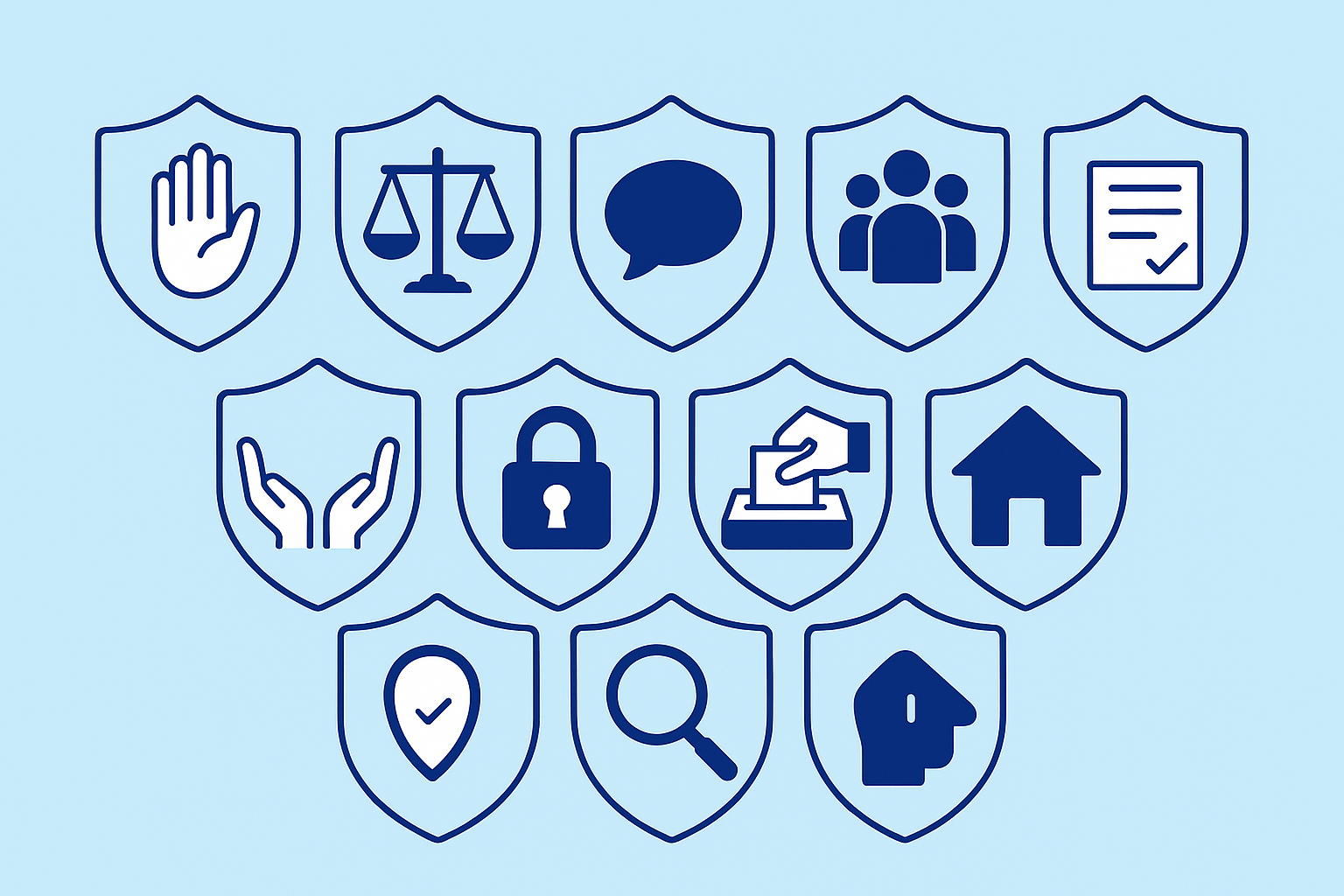Digital Nomads: Privacy on the Go
How much privacy do you think you sacrifice when you trade the corner office for a co-working space in Bali or a café in Buenos Aires? A recent study by Pew Research Center revealed that 69% of Americans are concerned about their personal data being used by companies, yet many digital nomads unknowingly increase their vulnerability exponentially. This blog post delves into the critical intersection of location independence, digital nomadism, and data protection. It’s designed to equip you with robust privacy tips for digital nomads and frequent travelers, ensuring you learn how to secure your data and stay safe while working from anywhere.
Table of Contents
Legal Framework
The legal landscape governing data privacy is a complex patchwork of international and national laws. One of the most significant pieces of legislation is the General Data Protection Regulation (GDPR) (Regulation (EU) 2016/679). Applying to any organization processing the personal data of individuals within the European Economic Area (EEA), irrespective of where the processing takes place. This means a digital nomad based in Thailand but servicing clients in Germany must abide by GDPR principles.
Similarly, the California Consumer Privacy Act (CCPA), as amended by the California Privacy Rights Act (CPRA), grants California residents significant control over their personal information, mirroring some of the GDPR’s protections. Businesses that collect personal information from California residents and meet certain revenue or data processing thresholds are subject to CCPA obligations.
Beyond these flagship laws, various other regulations impact data privacy, including:
- ePrivacy Directive (2002/58/EC) and its proposed successor, the ePrivacy Regulation, focusing on confidentiality of electronic communications.
- National laws implementing GDPR principles: Many countries outside the EU have adopted similar data protection legislation, such as Brazil’s LGPD or Canada’s PIPEDA.
- Sector-specific legislation: Laws regulating health information (HIPAA in the US), financial information, or children’s online privacy (COPPA in the US) may also be relevant.
Understanding the scope and applicability of these laws is the first crucial step in protecting your privacy as a digital nomad.
Key Legal Issues & Analysis
The intersection of digital nomadism & data privacy raises several complex legal issues.
Data Sovereignty and Jurisdiction
One of the most significant challenges is determining which jurisdiction’s laws apply.
Analysis: Data sovereignty refers to the concept that data is subject to the laws of the country in which it’s collected or stored. However, digital nomads often generate and process data across multiple jurisdictions. If you collect data while physically in Canada but route it through servers located in the EU and your client is in the US, which rules apply? This creates significant legal ambiguity. Complying with the strictest applicable law is generally recommended. The location of the data subject, ie the person whose data you are processing, is often the crucial factor.
Commentary: Legal experts emphasize the importance of clearly defining the “controller” (the entity determining the purposes and means of processing) and “processor” (the entity processing data on behalf of the controller) roles, plus using robust Data Processing Agreements (DPAs) that allocate responsibilities and provide for security measures.
Cross-Border Data Transfers
Many digital nomads rely on cloud services and tools that transfer data across national borders.
Analysis: GDPR restricts the transfer of personal data outside the EEA to countries that don’t offer an adequate level of protection, as determined by the European Commission. While the US now has the Data Privacy Framework, transfers to other countries may require Standard Contractual Clauses (SCCs) or Binding Corporate Rules (BCRs). Similar restrictions exist under other data protection laws. Failure to comply exposes you to potential fines and legal action.
Data: The Schrems II decision invalidated the EU-US Privacy Shield, highlighting the risks associated with relying on international agreements for data transfers. SCCs remain valid but require a careful assessment of the legal landscape in the recipient country.
Security and Data Breaches
Digital nomads often use public Wi-Fi networks and may be more vulnerable to cyberattacks.
Analysis: GDPR and other data protection laws require organizations to implement appropriate technical and organizational measures to protect personal data against unauthorized access, loss, or destruction. This includes using strong passwords, encrypting data, and implementing security software. Data breaches must be reported to relevant authorities within a specific timeframe.
Commentary: Under the GDPR, failure to adequately protect personal data can result in fines of up to €20 million or 4% of global annual turnover, whichever is higher. This emphasizes the importance of robust security measures and incident response plans.
Case Studies or Examples
Case Study 1: Marriott International Data Breach: In 2018, Marriott announced a massive data breach affecting approximately 500 million guests. Attackers had unauthorized access to the Starwood guest reservation database since 2014. The Information Commissioner’s Office (ICO) in the UK initially intended to fine Marriott £99.2 million under GDPR for failing to secure personal data. Though the final fine was reduced due to various factors. This case demonstrates the potential financial and reputational damage caused by data security failures. The implications for a digital nomad running a small business who suffers a similar data breach, would be devastating.
Case Study 2: Zoom’s Security and Privacy Issues: Early in the COVID-19 pandemic, Zoom experienced a surge in popularity, but also faced scrutiny over its security and privacy practices. Concerns included “Zoombombing” incidents, data routing through China, and misleading encryption claims. The FTC ultimately reached a settlement with Zoom for misrepresenting its security practices. This exemplifies the importance of transparency and accurate communication about data security measures.
Compliance & Best Practices
To navigate the complex legal landscape, digital nomads should adopt the following best practices:
- Conduct a Data Audit: Identify the types of personal data you collect, where it’s stored, and how it’s processed.
- Implement a Privacy Policy: Create a clear and concise privacy policy that informs users about how you collect, use, and protect their data.
- Get Explicit Consent: Obtain explicit consent before collecting or using personal data, particularly for marketing purposes.
- Use Strong Passwords and Encryption: Protect your devices and data with strong passwords and encryption. Use a VPN when connecting to public Wi-Fi.
- Implement Data Security Measures: Install security software, regularly back up your data, and implement a data breach response plan.
- Stay Informed: Keep up to date with changes in data protection laws and regulations.
- Use Privacy-Focused Tools: Consider using privacy-focused search engines like DuckDuckGo, encrypted messaging apps like Signal, and password managers.
Common Pitfalls & Legal Risks
- Ignoring GDPR Applicability: Many digital nomads mistakenly assume that GDPR only applies to businesses located in the EU.
- Failing to Obtain Consent: Collecting or using personal data without explicit consent can result in significant fines.
- Inadequate Security Measures: Using weak passwords or failing to encrypt data exposes you to data breaches.
- Data Breach Notification Failures: Failing to promptly notify relevant authorities and affected individuals of a data breach can result in additional penalties.
- Not Having a DPA: Where you are using third party services to process personal data (like cloud service providers), not having a DPA in place is a common violation of GDPR and other data protection regulations.
Future Perspectives
Data privacy laws are constantly evolving. The draft EU AI Act, for example, will have far reaching implications on the processing of personal data by AI systems. Expect increasing emphasis on data localization requirements, stricter enforcement of existing data protection laws, and greater scrutiny of cross-border data transfers. Digital nomads need to proactively adapt to these changes to remain compliant.
Conclusion
Protecting personal data is not just a legal obligation, but also a matter of ethical responsibility. As a digital nomad, you must be vigilant about safeguarding data and respecting individuals’ privacy rights. By understanding the relevant laws, implementing best practices, and staying informed about future developments, you can navigate the complex world of data privacy while enjoying the freedom of location independence.
Call to Action: Stay updated on data protection laws and best practices – subscribe to our newsletter! Consult a legal expert for personalized advice on data privacy compliance.
FAQs
Q: Do I need to comply with GDPR if I’m not located in the EU?
A: Yes, GDPR applies if you process the personal data of individuals within the EEA, regardless of your location.
Q: What is a VPN, and why should I use one?
A: A VPN (Virtual Private Network) encrypts your internet traffic and masks your IP address, protecting your data when using public Wi-Fi.
Q: What should I do if I experience a data breach?
A: Immediately assess the scope of the breach, notify relevant authorities and affected individuals as required by law, and take steps to prevent future breaches.
Q: What is a Data Processing Agreement (DPA)?
A: A DPA is a contract between a data controller and a data processor that outlines the roles and responsibilities relating to GDPR compliance. Any such contract should be reviewed by qualified legal counsel.


